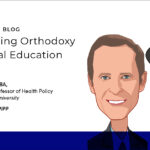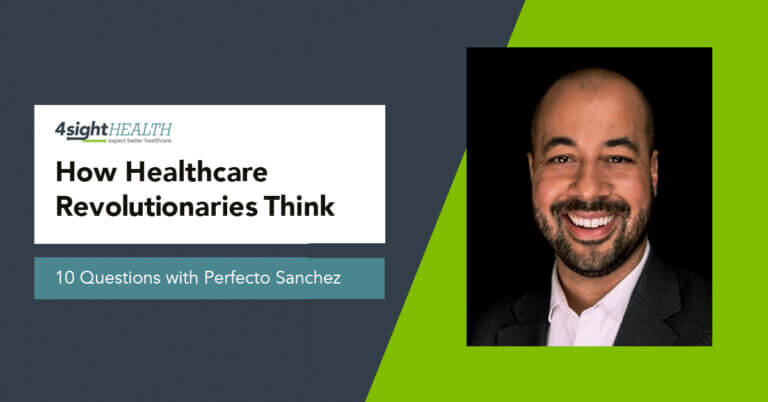August 4, 2022

Overcoming Orthodoxy in Medical Education
This article was first published on hlth.com.
On December 17, 2015, Kaiser Permanente announced the launch of a new tuition-free medical school. [1] Explicit in Kaiser’s bold decision is the belief that traditional medical education retards the development of population-based medicine. The Kaiser Permanente Bernard J. Tyson School of Medicine (KPSOM) enrolled its first class of medical students in July 2020.
KPSOM and several other new medical schools are emerging to promote interdisciplinary and interprofessional team-based care. They emphasize chronic disease management, proactive social interventions and health equity. They strive to train doctors to promote health as well as treat disease. These new schools are medicine’s future.
 Alarm bells should be ringing loudly in the halls of America’s medical schools. Instead, complacency reigns.
Alarm bells should be ringing loudly in the halls of America’s medical schools. Instead, complacency reigns.
Sounding the Alarm
The CDC estimates that the U.S. dedicates 90% [2] of its healthcare expenditures to treat chronic and mental health conditions. As chronic disease has proliferated, the healthcare system has treated its symptoms, not its root causes. In the process, healthcare has become too expensive, difficult to navigate and unresponsive to consumer preferences. Today, more Americans fear paying for medical bills than getting seriously ill. [3] That is just wrong.
Moreover, consumers confront a massive mismatch between the basic care management and mental health services they need and those the system offers. It is impossible to appreciate why this mismatch occurs without understanding the origins of modern American medicine and its current teaching paradigm.
In Flexner We Trust
In the early 1900s, the United States had only a few elite medical schools and institutions. Most physicians were quacks and most hospitals were squalid, unregulated and clinically inadequate. [4] In 1908, the Carnegie Foundation engaged Abraham Flexner to survey medical education in the U.S. and Canada. Flexner published his findings in 1910.
The Flexner Report promoted the Johns Hopkins training model, which included two years of science education and two years of clinical training, followed by extensive residencies at teaching hospitals. Broad adoption of the Hopkins model transformed American medicine. Its emphasis on evidence-based care delivery governs healthcare operations to this day.
More than a century after Flexner, medical education prioritizes specialty care and fosters fragmented, hospital-centric, physician-dominated and hierarchical treatment cultures. Aligned medical professionals, including pharmacists, nurse practitioners and physician assistants, rarely practice at the top of their license.
Despite the prevalence of chronic disease, current medical education and ongoing training place little emphasis on care management, engagement and social determinants of health. Orthodox medical education simply isn’t getting the job done as chronic disease and skyrocketing costs inflict an increasingly heavy burden on the American people.
A New Orthodoxy for Medical Education
Medical education is at the epicenter of healthcare transformation. New-era medical schools, like KPSOM, reject orthodox educational models that emphasize rote learning, condition-based care delivery (heroic medicine) and specialized research. Instead, they are developing curricula and programming to meet the broad-based health and healthcare needs of American consumers and communities.
Not surprisingly, “old” and “new” medicine conflict with one another in profound ways. (See more on what Learned Leadership Behaviors are common to Old Medicine, and what new behaviors New Medicine requires here.)
While still evolving, “new” medical education seeks to address consumers’ real health and healthcare needs. It incorporates these elements:
- Practical, applied learning with limited lecture time
- Emphasis on holistic health and well-being for both patients and students
- Longitudinal, collaborative, team-based care
- Community-focused service provision
- Practical training in advanced technologies and data science
- Value-based care delivery
- Openness to innovation
New medical education models center on training physicians to prevent, manage and alleviate complex health challenges. Their approaches emphasize engagement, prevention and team-based models for delivering holistic, value-based care.
Conclusion: Reinventing Medical Education
In 1910, the Flexner Report standardized medical education for a burgeoning scientific, industrial age. Despite tremendous advancement in medical science since, the American people are sicker than ever. Yet medical education has resisted adaptive change.
Today, physicians trained in the “old” Flexner medicine model enter their profession ill-equipped to meet the day-to-day care needs of patients and communities. That healthcare delivery model will not change until medical education transforms.
No paradigm shift happens without struggle. New, paradigm-busting medical schools are shaking off the burdens imposed by a century of static medical education. They’re training the medical professionals America needs to become a more equitable, productive and healthier nation.
At issue is the extent to which current medical education curriculum, training and institutions can adapt to new-world realities. As American healthcare transitions, new medicine’s behaviors, practices and cultures will displace old medicine. Long live new medicine!
David W. Johnson is CEO of 4sight Health. David Nash MD MBA is the Founding Dean of Jefferson College of Population Health and a full-time Professor of Health Policy; his latest book is “How COVID Crashed the System: A Guide to Fixing American Healthcare” publishing Fall 2022.
Dig deeper on this topic here. Opt in for 4sight Health commentaries here.
Read more
Overcoming Medical Orthodoxy (Part 1): The Origins of Dysfunction
Overcoming Medical Orthodoxy (Part 2): Reinventing Medical Education
Overcoming Medical Orthodoxy (Part 3): “Old Medicine” Is Showing Its Age
Overcoming Medical Orthodoxy (Part 4): Retooling Clinicians for “New Medicine”
Sources
[1] https://www.bizjournals.com/sanfrancisco/news/2015/12/17/kaiser-permanente-to-open-its-own-school-of.html
[2] https://www.cdc.gov/chronicdisease/about/costs/index.htm
[3]https://www.norc.org/PDFs/WHI%20Healthcare%20Costs%20Coverage%20and%20Policy/WHI%20Healthcare%20Costs%20Coverage%20and%20Policy%20Topline.pdf
[4] https://www.theatlantic.com/magazine/archive/1910/06/medical-education-in-america/306088/





